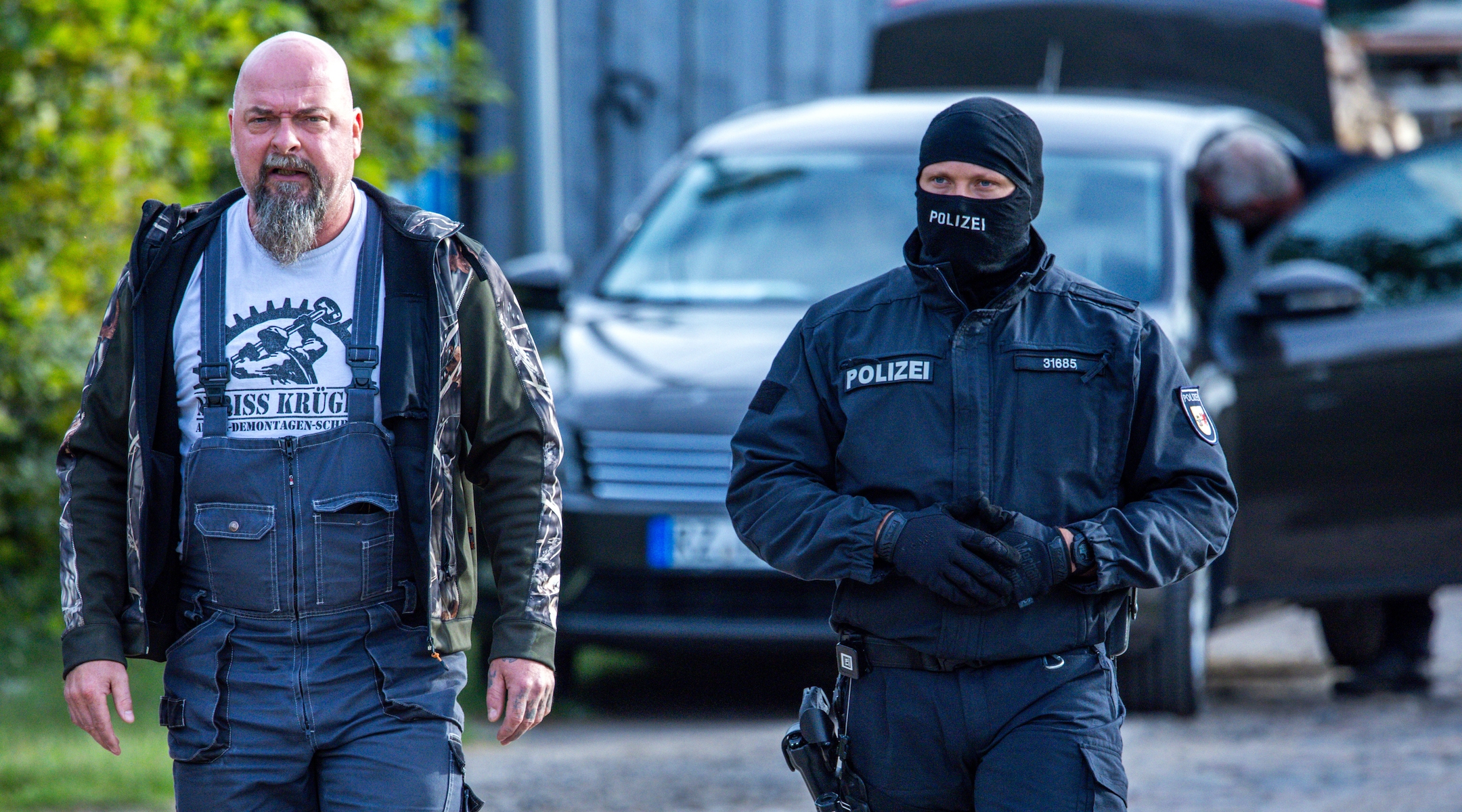Germany bans neo-Nazi group to send ‘signal against racism and antisemitism’
The group, founded in the 1990s, reportedly has only 130 known members but is considered influential in the neo-Nazi scene

19 September 2023, Mecklenburg-Western Pomerania, Jamel: Sven Krüger (l), a right-wing extremist known throughout Germany, is accompanied by a police officer during a search operation on his property. Federal Interior Minister Faeser has banned the right-wing extremist association “Hammerskins Germany” as well as its regional offshoots and the sub-organization “Crew 38”. According to the ministry, police task forces searched the homes of 28 suspected members of the association in ten German states in the early morning. Photo: Jens Büttner/dpa (Photo by Jens Büttner/picture alliance via Getty Images)
(JTA) — Germany has banned a neo-Nazi group after raiding the homes of its leaders across the country, in a move the government said “sends a clear signal against racism and antisemitism.”
The Hammerskins, a local spinoff of a group founded in the United States in the late 1980s, are accused of promoting criminal activities and of opposing the German constitution. According to a recent report from Germany’s Federal Office for the Protection of the Constitution, the group was the only the only remaining neo-Nazi organization active nationwide.
“The ban of the Hammerskins Germany is a hard blow against organized right-wing extremism,” German Interior Minister Nancy Faeser said on Tuesday. “With this ban, we are putting an end to the inhumane activities of an internationally active neo-Nazi association in Germany… This sends a clear signal against racism and antisemitism.”
The German group, founded in the 1990s, reportedly has only 130 known members but is considered influential in the neo-Nazi scene. German police raided the homes of 28 suspected leading Hammerskins members in 10 states across Germany on Tuesday.
It is rare for Germany to ban a political organization, thanks to postwar guarantees of free speech and assembly. Exceptions occur when an organization threatens the democratic state, or if it denies or glorifies the country’s Nazi past.
The Hammerskins are reportedly the 20th right-wing extremist organization that Germany has banned. For example, in 2007, Germany banned Collegium Humanum, its member organization Bauernhilfe and the Association for the Rehabilitation of Those Persecuted for Denying the Holocaust” as “reservoirs of organized Holocaust denial.” In 2020, the government banned the groups Combat 18, Nordadler, and Sturmbrigade 44/Wolfsbrigade 44; and in 2021, they banned Nationale Sozialisten Rostock and its spinoff, the Baltik Korps.
But in 2017, to the disappointment of Jewish groups in Germany, the supreme court rejected a ban on the far-right party NPD — the National Democratic Party of Germany, which changed its name this year to “The Homeland” — saying they were not dangerous enough to warrant such an extreme response. The NPD never succeeded in gaining parliamentary seats on the national level.
Meanwhile, the right-wing party Alternative for Germany (AfD) party, founded in 2013, has made continual political headway, reaching the national parliament, the Bundestag, and thus receiving taxpayer funding for their activities and infrastructure. There have been calls for it to be banned from politics over its anti-immigrant platform and the Holocaust relativization of some leading members.
This article originally appeared on JTA.org.














